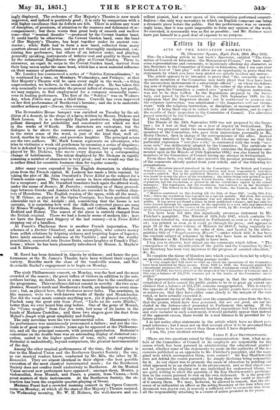ilitairto Auh 3a5ir.
The almost simultaneous production of 17delio, the most German of German operas, at the two Italian theatres, and its enthusiastic reception. at both, is a notable fact as marking musical progress,. But a few years since, even Don Giovanni was too German for the taste of opera-goers. It used to be given two or three times in a season, on " off-nights," to please: the middle-class amateurs, who filled the pit, while there was a beggar/yr account of empty boxes. With the fashionable habitues nothing would go down but Rossini and his Italian successors. Now we have two great Italian theatres from which Italian operas are all buebanished.. We care less than we did for music as a more pleasure of! sense : to satisfy us, it. must have depth, solidity, and strength—it must appeal to the intellect and move the feelings—it must be a dramatic language.
Fidelio at Covent Garden, as well as at Her Majesty's Theatre, is a noble entertainment. In some respects it Ms below but in others sur- passes, the performance at the rival house. In the most essential feature,. the representation of the heroine, Castellan is very inferior. to Cruvelli. She sings with grace and sweetness, and from time to time throws out sparks of energy and feeling; but she cannot, like Selureder-Devrient,,. Malibran, and Cruvelli, form alarge and lofty conception. of the character, and fill the mind with the emotions derived from the contemplation of its: moral beauty. On the other hand, Tamberlik in Floresian, and Formeerin Rocco, are superior to any of their predecessors in these parts. Ternberlik, as the doomed prisoner, preserves his nobleness in the midst of physical' prostration, and his singing is the soul of impassioned tenderness. It is generally remarked that Formes has greatly. smoothed. his vocal rough- ness : ho gives the finest possible effect to the concerted • ieees—the two
fine trios especially; and his dramatic picture of the -hearted gaoler is genial and. pleasing. The performance of Pizarro at the two houses.— by Coletti. and Tagliatleo—is equally satisfactory ; and the same thing is the case with the subordinate partsof iaoguine and Mares/Una. The chorus-singing at Covent Garden, on Tuesday, the first nigh
much short of its usual quality. The choral band was neither so strong- nor so disciplined as it ought to be. The famous chorne-of prisoners was actually bad—at the other house it was far better,, in its picturesque grouping, its dramatic action, and the fiffness and purity of its. har- mony. But the Covent Garden orchestra maintains- its surpassing, excellence. Fide& is unriValled for the richness and variety of its in-- strumentntiont; and,never,. probably, have these qualities been. so staila ingly diaplayed. The orchestra of Her Majesty's Theatre, is now much improved, and indeed is positively good ; it is only by comparison, with a still higher excellence that its defects are felt. There is seldom any want of discipline, of precision, of attention to the nuances and delicacies of ac-. companiment; but there wants that great body of smooth and mellow tone—that " musical thunder "—produced by the Covent Garden band. It could hardly be otherwise: the Covent Garden band, once the band of Her Majesty's. Theatre, has- kept together under its ancient eon- diretor ; while Belie had to form a new band, collected- from many quarters abroad and at home, and not yet thoroughly amalgamated, con- taining fine performere, but others of an inferior order, and playing, generally speaking, instruments of inferior cost and quality to those used by the substantial Englishmen who play at Covent Garden. There is, moreover, an esprit de corps in the Covent Garden band, derived from their long union under the same head, which has a most materialinduenee on. their manner uf performance. Mr. Lumley has commenced a series of "Soirees Extraordinaires," to be continued for a timer on Mondays, Wednesdays, and Fridays; so that Her Majesty's Theatre will be open every night in the week,—a thing unprecedented, we believe, in the annals of the opera. He has taken this step nominally to accommodate the present influx of strangers, but partly, we may suppose, to find employment for a company unusually nume- rous in leading performers. The first of the " Soirees" was on Wednes- day, when Fidelio was given a third time. Cruvelli has even improved on her first performance of Beethoven's heroine; and she is to undertake another arduous part—Norma, this evening.



























 Previous page
Previous page